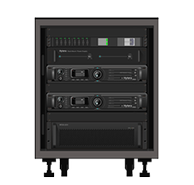The Background/The Project
BACIL is a crime initiative based in Leeds. BACIL (Business Against Crime In Leeds) is run by a small, dedicated team who work with over 420 members from both the day and night time economy to prevent, deter and detect crime and anti-social behaviour across the city centre and outlying areas.
BACIL works in partnership with Leeds City Council, West Yorkshire Police, Safer Leeds and other bodies across the city. Information is shared via a member’s website and a two-way radio system, which gives members real-time access to the latest crime news in the area.
Intelligence is built up from prison releases to make town centre businesses aware of offenders returning to the streets. A ‘rogues gallery’ of any known offenders with up-to-date photos is available on the website, so businesses can easily and conveniently identify criminals.
The website is utilised in conjunction with a tablet, so crime updates can be accessed at any time. The radio system enables members to communicate city-wide to other businesses and agencies on the network. It provides a quick and efficient way of sharing information and passing on warnings to groups of people and businesses simultaneously.
The Challenge
BACIL’s existing radio system needed to be upgraded and capacity expanded. The new solution needed to work across multiple platforms and support interoperability between different radio standards to provide a bridge between businesses located in the city centre and those in outlying areas.
The client reviewed various radio systems and terminals from a number of manufacturers, but the Hytera PD600 hand portable radio series was favoured due to its lightweight casing and multiple device options.
BACIL implemented a competitive tender to select its radio communications supplier for the design, commissioning, and deployment of the new solution. Hytera partner Radiocoms Systems was awarded the contract.
The Solution
A Hytera XPT (Extended Pseudo Trunking) Digital Mobile Radio (DMR) system was chosen. The great benefit of choosing XPT is that it turns a DMR Tier 2 conventional system into a DMR Tier 3-style multi-site digital trunking solution. It enables dynamic assignment of channel resources, but without the need for a dedicated network control channel, as with DMR Tier 3. XPT is a very cost-effective way to increase the capacity of the radio network when limited spectrum resources are available.
Radiocoms supplied 400 Hytera PD665 hand portable terminals. The PD665 is a slim, professional, digital two-way radio delivering excellent voice clarity. It is just 27mm thick and only weighs 310g, making it ideal for retail staff, who don’t want to carry a heavy radio all day. Emergency mode, priority interrupt and lone worker features are provided as standard to enhance worker safety.
It features an LCD screen, programmable keys and is IP67 rated for resistance to dust and water ingress. It is both rugged and reliable and able to stand up to a lot of daily wear. Its long-life battery provides approximately 16 hours of use, making it ideal for the long opening hours associated with retail and entertainment businesses.
The Results
BACIL reports that there has been a significant reduction in business crime since it was founded. The Hytera DMR solution has given BACIL greater capacity, as it grows the system across Leeds City Centre, including high street businesses and retail parks where there has been an increase in crime.
The COVID-19 pandemic has seen a surge in crime, but the radio system has continued to provide vital support for the initiative. BACIL is planning to extend coverage to outer city areas such as Morley and Headingley by implementing Radiocom’s Private Push-to-Talk over Cellular (PoC) server.
Users in these areas will be given PoC devices, which will be patched into the main DMR radio solution to enable radio and PoC users to talk to each other and to provide a communications bridge between the city centre and outlying areas.


